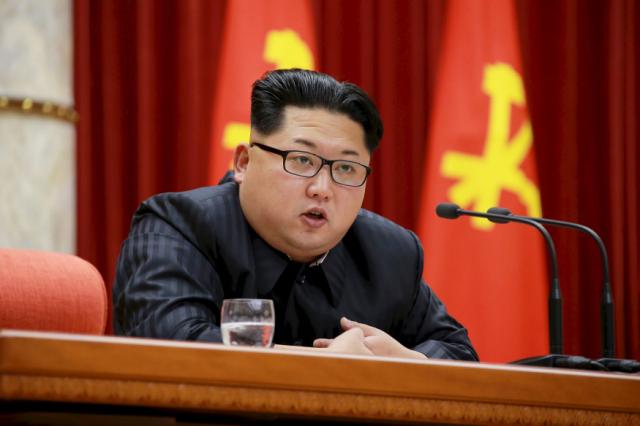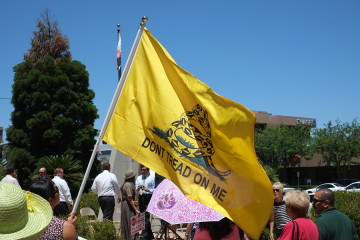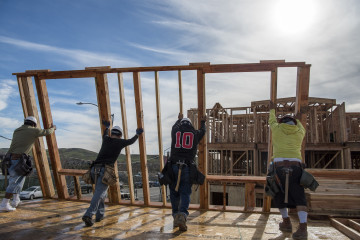rump Finds Asian Allies Cool to U.S. Attack on North Korea

published Apr 12th 2017, 7:50 pm, by David Tweed
(Bloomberg) —
U.S. President Donald Trump is finding little support among his Asian allies — both publicly and behind the scenes — as he weighs a military attack on North Korea after unilaterally firing missiles on Syria.
Any attack on Kim Jong Un’s regime — even a limited strike on weapons facilities — risks catastrophic blowback on some of Asia’s biggest economies. It could threaten to trigger a U.S. war with China and leave the capitals of allies South Korea and Japan at risk of destruction, the same calculation that has helped maintain an uneasy peace since the Korean War in the 1950s.
“This has the potential to turn into a conflagration that Asia hasn’t seen since the Vietnam war,” said Brian Bridges, a Malaysia-based adjunct professor of Asian politics at Lingnan University in Hong Kong. “If anything, his unpredictability makes the situation more risky because the North Koreans aren’t 100 percent sure he won’t attack.”
Trump has sent warships near North Korea and threatened to act alone if necessary to prevent it from gaining the capability to strike the U.S. with a nuclear weapon. The unease has wiped $30 billion from South Korean equity values this week and driven a spike in the nation’s debt risk, as Kim shows signs of conducting another nuclear or ballistic-missile test.
“You never know, do you?” Trump said in an interview Tuesday with Fox Business Network, when asked what he was planning for North Korea. “We are sending an armada, very powerful. We have submarines, very powerful, far more powerful than the aircraft carrier, that I can tell you.”
Read more about what Korea traders are watching
While it’s unclear how much allies’ concerns would influence Trump administration calculations on any strike, Foreign Ministry spokesman Cho June-hyuck told reporters in Seoul on Tuesday that the U.S. said it wouldn’t take action without first consulting South Korea. He called speculation that the Korean peninsula would face a crisis this month “groundless.”
South Korea doesn’t support a pre-emptive strike and is closely coordinating with the Trump administration, according to an Asian government official familiar with North Korean issues who asked not to be identified. Trump must take into consideration the countries affected for any military decision, the official said.
Yoshihide Suga, the top spokesman for Japanese Prime Minister Shinzo Abe’s government, declined to comment Wednesday on whether the country would support a U.S. strike on North Korea.
‘Psychological Warfare’
“Given that the security environment is worsening, it is extremely important to make sure of the U.S. deterrent,” Suga told reporters in Tokyo in response to questions about the safety of Japanese citizens. “We approve of the U.S. attitude of keeping all options on the table.”
Japan might only support a limited strike that targeted North Korea’s weapon facilities, according to a person with knowledge of the Abe administration’s thinking. In that scenario, the biggest risk Japan sees would be a North Korean attack on U.S. bases in the country, said the person, who asked not to be named while discussing matters of national security.
“This is psychological warfare,” said Narushige Michishita, a former Japanese defense ministry official and professor of strategic studies at the National Graduate Institute for Policy Studies. “When you want to scare your enemy, you have to make your own people believe that this is real. It is only natural that the U.S. is playing this game. While playing this game, the U.S. cannot tell us clearly that this is just bluffing.”
China Pressure
Trump has focused his attention on pressuring China, North Korea’s main military ally and benefactor. He spoke by phone with President Xi Jinping on Wednesday morning in Beijing, shortly after saying that China could get a better trade deal with the U.S. if it reined in a regime it has supported since the Korean War, in part to prevent having an American ally on its doorstep.
“President Xi wants to do the right thing,” Trump told reporters on Wednesday. “I think he wants to help us with North Korea.”
Xi told Trump that talks were the only way to resolve tensions, repeating a longstanding Chinese line. Foreign Ministry spokesman Lu Kang used stronger language, telling reporters Monday: “It is irresponsible and even dangerous to take any actions that may escalate tension.”
China signaled to North Korea that it was running out of patience. The Global Times, a nationalist newspaper affiliated with the Communist Party, warned that a nuclear test now would represent a “slap in the face” to the U.S. government and could prompt China to restrict oil sales to North Korea.
“Pyongyang should avoid making mistakes at this time,” the paper said.
‘Bizarre Weirdo’
The article marks a change in tone from the withering criticism unleashed after the U.S. began deploying the Terminal High Altitude Area Defense, or Thaad, anti-missile shield in South Korea in March. North Korea’s most recent ballistic missile test was on April 5, the eve of the first meeting between Xi and Trump in Florida.
“There is already a debate going on inside China about whether it is in China’s interests to cut off North Korea,” said Robert Kelly, a political science associate professor at South Korea’s Pusan National University. “They know that North Korea is a bizarre, weirdo throwback and that as China gets more powerful it won’t matter if there is a unified Korea on their doorstep. Trump is pushing on an open door.”
The most immediate reaction by North Korea to a strike would likely be massive artillery fire on Seoul and its surroundings, which is home to just more than half of South Korea’s 51 million people, according to a report published by Stratfor last year. North Korean artillery installations along the border can be activated faster than air or naval assets and larger ballistic missiles that can target South Korean, Japanese or American bases in the region with nuclear, chemical and biological weapons.
South Korea Talks
While residents of Seoul are used to threats from North Korea, the issue has dominated the campaign for a presidential election on May 9. The front-runners, Moon Jae-in and Ahn Cheol-soo, have indicated they would seek talks with North Korea, and the caretaker government would be unlikely to approve a strike before then.
Even conservative lawmakers in South Korea don’t see an attack anytime soon. Kim Young-woo, a lawmaker with the Bareun Party and chairman of the National Assembly’s National Defense Committee, said if anything the U.S. might take action if North Korea threatened allies with an intercontinental ballistic missile — a prospect raised by former Pentagon chief Ash Carter in January.
“How are we different from Syria? The U.S. would be mindful that the high population density here makes any expansion of war, if there is one, very easy,” Kim said. “I don’t think the U.S. is ready to strike any part of the North just yet.”
-With assistance from Ting Shi, Isabel Reynolds, Kanga Kong, Peter Martin, Russell Ward and Maiko Takahashi.To contact the reporter on this story: David Tweed in Hong Kong at dtweed@bloomberg.net To contact the editors responsible for this story: Daniel Ten Kate at dtenkate@bloomberg.net Larry Liebert
COPYRIGHT
© 2017 Bloomberg L.P
NICODES







No Comment